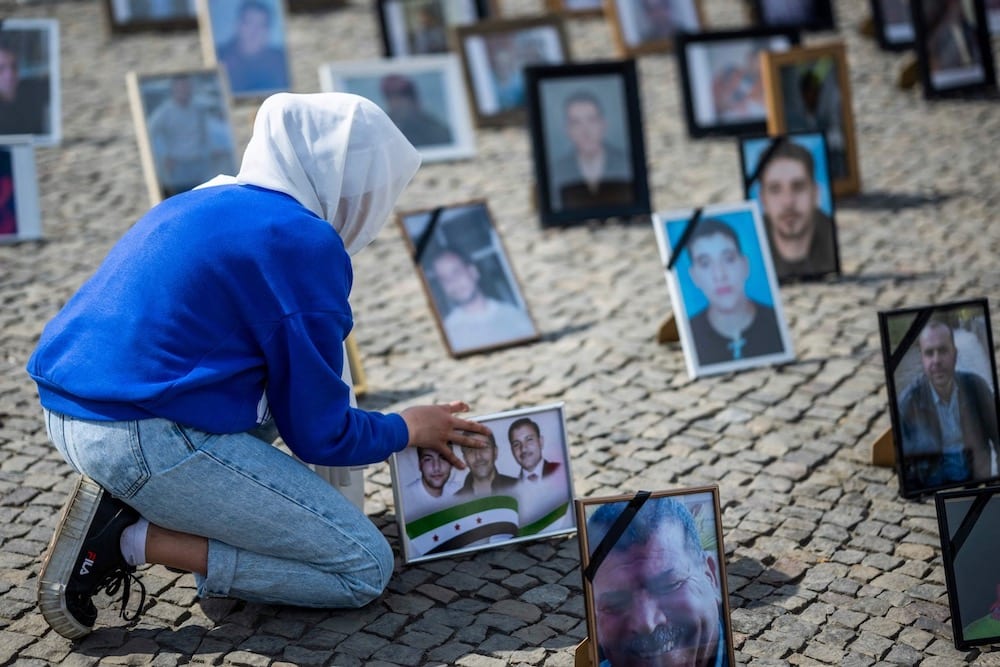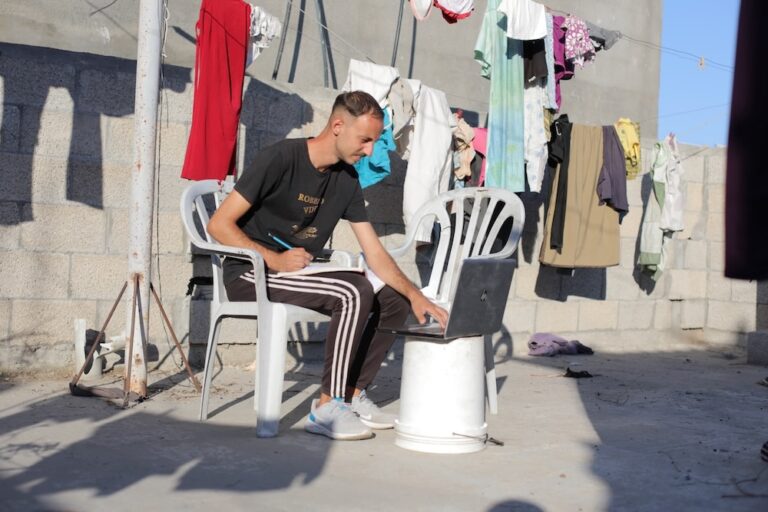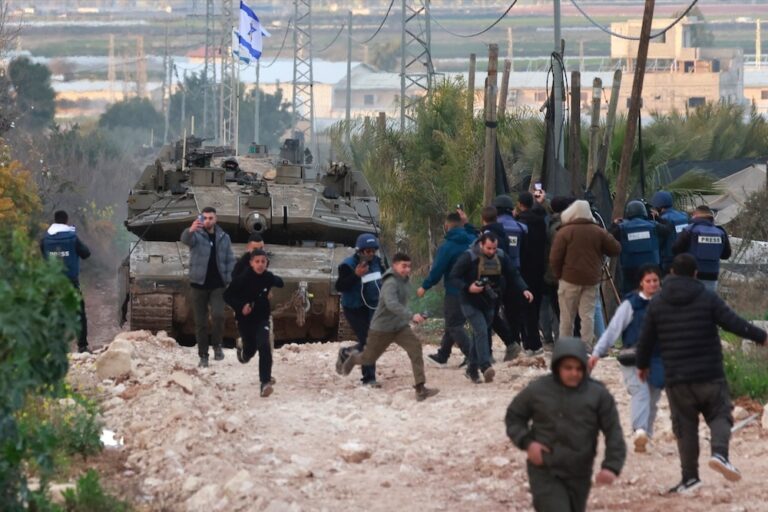June 2023 in MENA: A free expression round up produced by IFEX’s Regional Editor Naseem Tarawnah, based on IFEX member reports and news from the region.
The UN establishes an independent body to investigate the fate of Syria’s forcibly disappeared people. Counter-terrorism measures stifle free expression and threaten civic space. Internet shutdowns during school exams cut off access to information across the region. Judicial feud hinders Beirut port blast investigation.
The search for truth, justice and accountability in Syria
June saw significant strides in the pursuit for justice and accountability for Syria’s war victims and their families. On 29 June the UN General Assembly passed a historic resolution establishing an independent body to help uncover the fate of thousands of missing people, including anti-government protesters and human rights defenders.
While exact numbers are unknown, it is estimated that at least 100,000 people have been forcibly disappeared since the 2011 conflict began, leaving thousands of families in limbo, not knowing the fate of their loved ones.
The independent body is the culmination of the tireless collective advocacy by civil society organisations, activists, and families of missing persons in Syria.
Ahead of the vote, over 100 rights groups urged UN member states in a joint letter to pass the resolution, calling the independent institution that is to be established: “the first-ever response to the Syrian conflict to be entirely imagined and developed by Syrian victims and survivors of enforced disappearance and families of missing persons.”
IFEX member Syria Center for Media and Freedom of Expression (SCM) welcomed the UN decision, calling it: “a first step to finding fair solutions to the issue of the forcibly disappeared and missing” and “a prelude to a national path of transitional justice”. Human rights lawyer and SCM general director Mazen Darwish said:
“This decision is a real glimmer of hope and a first step that requires genuine cooperation and hard work from all local and international parties in order for it to successfully achieve the right to knowledge and truth.”
Earlier in the month, the governments of Canada and Netherlands filed a joint case against the Syrian state at the International Court of Justice (ICJ) in a concerted effort to hold the regime accountable for its grave human rights violations, including torture, gender-based violence, and enforced disappearances of thousands of civilians.
According to SCM, the Dutch-Canadian action contributes to international efforts working towards addressing the state of impunity in Syria, and also removes the obstacle of the veto power that both Russia and China hold at the UN Security Council, which has blocked referral of the Syrian file to the International Criminal Court (ICC).
While Canada pursues justice for Syrians at the ICJ, prominent Syrian human rights defender Noura Aljizawi, whose testimony about her detention and torture was part of evidence presented in the joint case, is now at risk of being deported by Canadian immigration. The activist, who fled to Canada in 2017, was flagged as a security risk reportedly after providing her testimony, raising concerns of potential political meddling in her case.
Countering counter-terrorism policies: tools of ‘repression and reprisal’
Last month’s UN Counter-Terrorism Week saw civil society organisations engage in a critical conversation on the impact of counter-terrorism policies on human rights in the region.
IFEX members the Gulf Centre for Human Rights (GCHR), Human Rights Watch (HRW), and the Cairo Institute for Human Rights Studies (CIHRS), as well as the Civil Society Coalition on Human Rights and Counter-Terrorism shed light on how counter-terrorism policies have been adopted by states to undermine the rule of law and restrict basic rights and freedoms under the pretext of protecting national security.
The Executive Director of GCHR, Khalid Ibrahim, pointed to how oppressive governments in the region have used counter-terrorism laws to target civil society, with many journalists, political opponents, and human rights defenders, including women, facing arbitrary arrests and detentions, torture, and handed prison sentences based on fabricated charges.
Ibrahim also underscored the role governments and surveillance technology companies in the West play in providing unconditional support to oppressive states in the MENA region, calling it: “one of the main reasons why our colleagues are still in prison.”
On the sidelines of the UN event, Fionnuala Ní Aoláin, the Special Rapporteur on the promotion and protection of human rights and fundamental freedoms while countering terrorism, released the first independent global study detailing the impact of counter-terrorism measures on civil society and civic space. The study reveals how the widespread and systematic targeting of civil society has undermined the effectiveness of counter-terrorism efforts.
CIHRS welcomed the study’s release and called for the development of monitoring and documentation mechanisms at the national and international levels to counter the entrenched patterns of human rights violations, and hold perpetrators accountable.
As part of its contributions to the report, CIHRS highlighted the cases of Algeria, Egypt, Libya and Palestine as countries in the region that “clearly exemplify the trend of governments exploiting the permissive counter-terrorism environment to label as terrorist non-violent critics, political activists and human rights defenders, as a tool of repression and reprisal.”
#NoExamShutdowns: Keeping the information lights on
Governments across the region have increasingly used internet shutdowns during school exams. The pretext is to prevent cheating – the impact is the cutting off of critical services and access to information in the process.
Ahead of national exams last month, over 300 rights groups representing the #KeepItOn coalition called on Iraqi Prime Minister Mohammed Shia’ Al Sudani to put an end to the practice, highlighting how internet disruptions: “limit people’s ability to communicate, express themselves, and access necessary information during emergencies and crises constitutes a violation of the fundamental right to freedom of expression.”
IFEX member Social Media Exchange (SMEX) has been closely monitoring and sounding the alarm about the larger impact internet shutdowns during exams have on societies and economies in the region, particularly in places experiencing conflict.
In Syria for instance, internet outages are acutely harmful to its residents as the internet provides the only real way to access information, monitor human rights violations, and connect with families in the diaspora. In Algeria, journalists noted how shutdowns have delayed the news cycle of up to several hours, “as if we were still in the 1990s.”
Lebanon: Activists summoned, accountability for port blast elusive
Activists in the Southern Mount Lebanon region of the country continue to be summoned by local authorities over their critical social media posts. Rashad Zeidan and Salam Saab were interrogated by the Cybercrime and Intellectual Property Bureau over complaints that the two activists were allegedly running a Facebook page publishing corruption stories in the largely Druze community.
According to SMEX, the politically-motivated summons have resulted in activists being pressured to sign pledges restricting them from the right to criticise specific individuals and institutions, including the complainant party, in an effort to silence them.
As the third anniversary of the Beirut port explosion that killed more than 200 people approaches, Lebanese authorities continue to hinder efforts to hold those responsible to account and bring justice for the victims and their families. An evolving judicial feud continues to thwart the investigation into the blast, after investigative judge Tark Bitar brought charges against high-ranking political and security officials in the government earlier this year.
The inaction has renewed calls for the UN to establish an international and independent fact-finding mission to uncover the truth and determine responsibility for the tragic event.
Last month, Lebanese investigative journalist Riad Kobaissi received the 2023 ICFJ Knight International Journalism Award for his work in revealing corruption within the government, including that of customs officials prior to the Beirut port blast.
New & Noteworthy
In Iran, cartoonist and activist Atena Farghadani was detained on undisclosed charges after posting a satirical political cartoon on her Instagram account for the first time since 2020. Information about her whereabouts remains unknown. In 2016, Farghadani was released after serving 18 months in prison for portraying lawmakers as animals in response to a draft law restricting contraception.
ARTICLE 19, along with YouTube and Amnesty International UK honoured the life of Iranian vlogger Sarina Esmailzadeh as an icon of the women-led movement that erupted following the murder of Mahsa Jhina Amini last year. The 16-year old vlogger was reportedly killed by security forces during the anti-government protests.
In Egypt, authorities added two more news websites – Soulta 4 and Masr 360 – to the growing list of blocked websites in the country. The move coincides with the discussion of the right to access information during ongoing national dialogue sessions, raising great concerns about the seriousness of the Egyptian authorities in making information available.
Lastly, GCHR launched a new Emergency Resources Hub on its newly-designed website that connects users to advocacy, safety, wellness tools, as well as funding and emergency grants.



